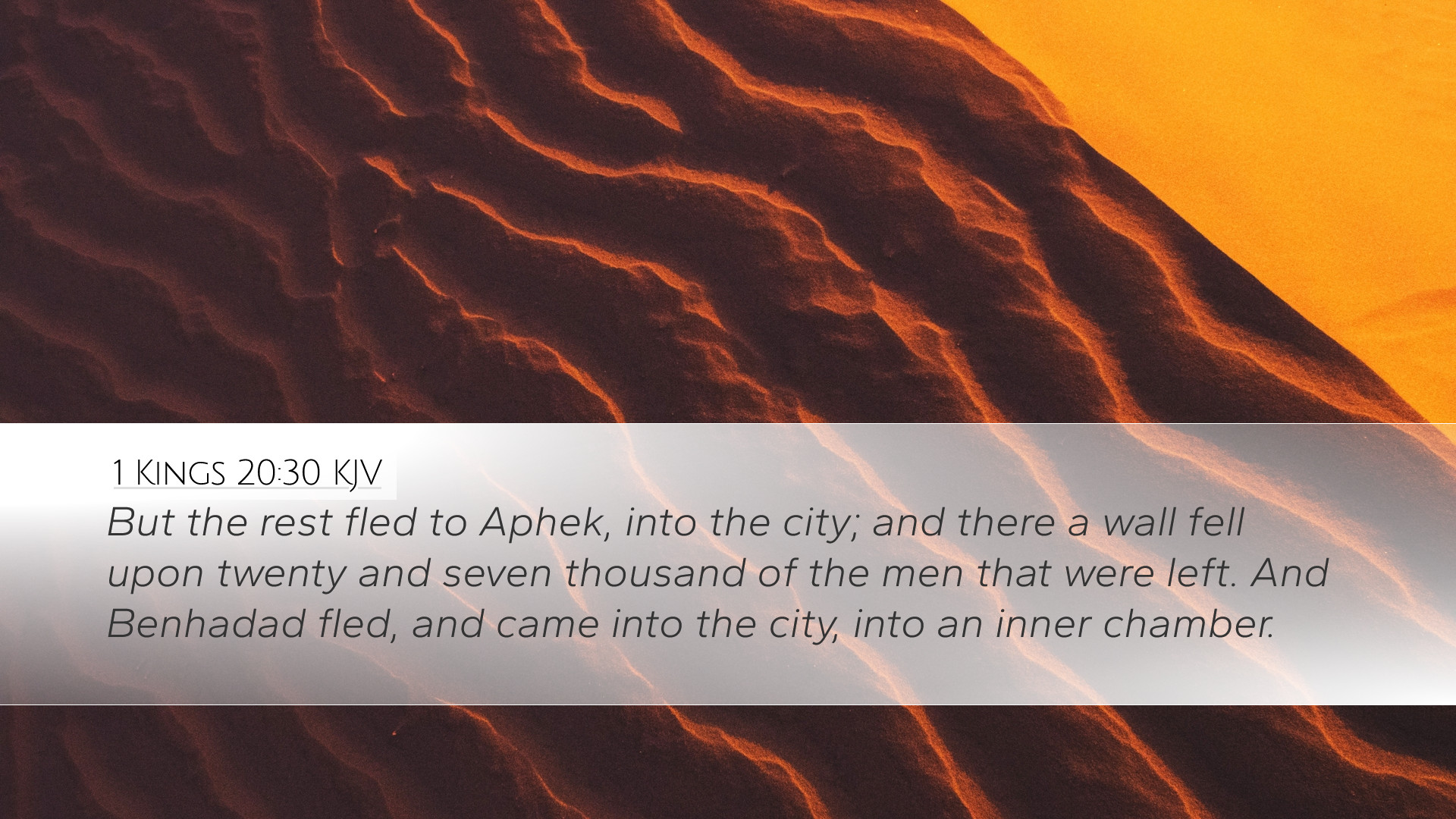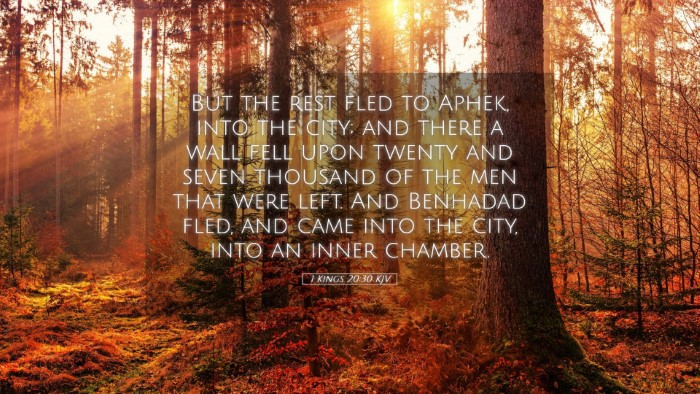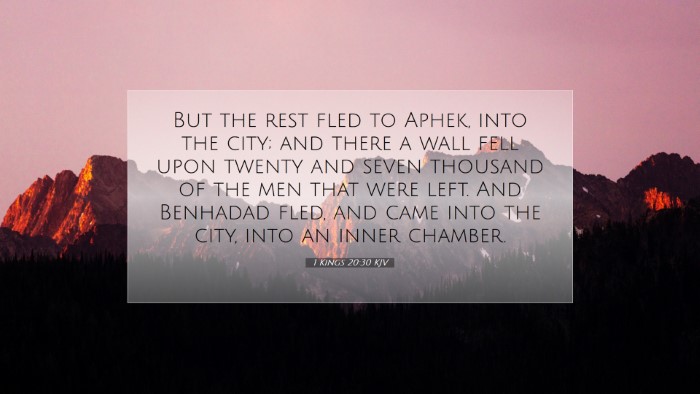Commentary on 1 Kings 20:30
In 1 Kings 20:30, we come across a poignant verse that reflects the dire consequences of warfare and the complex interplay between human decisions and divine providence. This commentary synthesizes insights from notable public domain scholars including Matthew Henry, Albert Barnes, and Adam Clarke, offering a rich tapestry for pastors, students, theologians, and Bible scholars.
Verse Context
1 Kings 20:30 (KJV): "But the rest fled to Aphek, into the city; and there a wall fell upon twenty and seven thousand of the men that were left." This verse is situated in the narrative of Ahab's confrontations with Ben-Hadad, King of Syria, illustrating the aftermath of the battle and the overarching theme of God’s sovereignty amidst human affairs.
Thematic Exploration
- The Sovereignty of God: The verse highlights the sovereignty of God in directing the course of events. While the fleeing men sought refuge, it was the divine hand that permitted the collapse of the wall, showcasing that our safety and security ultimately rest in God’s will.
- The Consequences of War: The stark figure of 27,000 casualties speaks to the tragic consequences of conflict. This correlates with Matthew Henry’s observations of the grave toll of warfare, which reflects not only physical destruction but also spiritual ramifications.
- Human Agency and Divine Judgment: The actions of Ahab and Ben-Hadad set the stage for conflict, and this verse exemplifies how human decisions can lead to unforeseen tragedies. Clarke notes that while the enemy faced defeat, there is a profound lesson on the nature of judgment that God exercises upon nations.
- Pathetic Nature of Fleeing: The imagery of men fleeing to the city suggests a desperate attempt at safety. Barnes emphasises that even in retreat, one is still vulnerable; the wall's collapse signifies the futility of relying solely on human constructs for protection.
Historical Background
The context of 1 Kings involves ongoing tensions between Israel and neighboring nations. King Ahab, despite his notoriety for idolatry and moral failure, finds himself at the center of divine deliberations. The siege conducted by Ben-Hadad marks a significant episode in Israel's history, symbolizing both physical conflict and a more profound spiritual decay within the nation.
Commentary Insights
Matthew Henry
Henry articulates that the fall of the wall serves a dual purpose: it is an immediate consequence of the battle's outcome and a larger symbolism of divine retribution against those who flaunt God's laws. The calamity that befalls the Syrians reflects not just a military defeat but also emphasizes God's ultimate authority over life and death.
Albert Barnes
Barnes provides a vivid description of the events leading to this climax, citing the improbability of such a disaster occurring naturally without divine intervention. He emphasizes the moral that, regardless of how secure one may feel within fortified walls, without God's protection, they are susceptible to calamity.
Adam Clarke
Clarke points to the significance of the location, Aphek, which was known for its fortifications. The collapse of the walls that were thought to ensure safety underscores Clarke's insistence on the need for recognizing God’s presence and power in all circumstances. He warns that human structures and fortifications are no match for divine will.
Theological Implications
- The Nature of God’s Judgment: The verse prompts reflection on God's judgment, often executed in unexpected ways. It challenges the reader to consider how divine justice unfolds and how we are implicated in the moral fabric of our society.
- Assurance of God in Crisis: In moments of crisis, the tendency to rely on human strength may overshadow the necessity of divine reliance. This illustrates the need for believers to find solace in God’s presence, regardless of external circumstances.
- Lessons on Leadership: Ahab as a leader is confronted with the consequences of his actions. Pastors and leaders are encouraged to reflect on the importance of righteousness and integrity in positions of authority, understanding that their decisions have far-reaching implications.
Practical Applications
For contemporary application, this passage serves as a reminder to trust in God amidst the overwhelming trials of life. Leaders are cautioned to govern with an understanding of their accountability to God, while individuals are encouraged to seek refuge in divine promises rather than human assurances.
In a world rife with conflict and uncertainty, the imagery of a city wall collapsing serves as a sobering warning against misplaced trust. It calls forth a spirit of humility and dependence on God's providential care, urging readers to engage in prayer and spiritual vigilance.
Conclusion
1 Kings 20:30 encapsulates profound lessons on the nature of warfare, the sovereignty of God, and the tragic outcomes stemming from human conflicts. The insights drawn from the commentaries of Henry, Barnes, and Clarke enrich our understanding of the text and beckon us into deeper theological reflection and spiritual practice.


